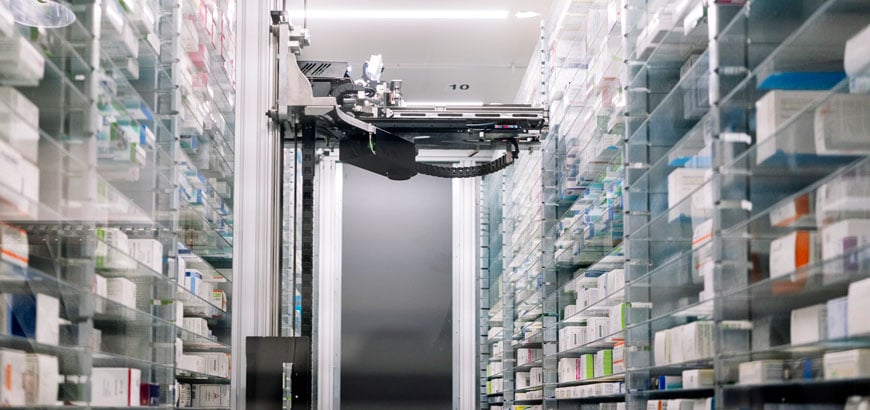
This visual helps illustrate the nuances of each type of bagging in specialty pharmacy and what it may mean for your health system.
Experts discuss the future of health system pharmacy and its expanding role in healthcare.
By
Date
August 05, 2022

By: Craig Dolan and Josh Jang
Read time: 4 minutes
As very accessible healthcare professionals, and often, a primary point-of-contact for many patients, pharmacists have an important part to play in the future of healthcare. The role of health system pharmacists has grown exponentially since the pandemic, and as issues arise with staffing shortages, supply chain disruptions, and changing pandemic guidelines, pharmacists are on the front line addressing the major challenges facing health systems.
These efforts have garnered respect and awareness of the work being done by health system pharmacists, providing an opportunity for the profession to redefine its future role within healthcare.
Q: What is the current role of health system pharmacy? How did the pandemic affect and change that role?

Craig Dolan BSPharm, PharmD, MBA Vice President, Business Development & Innovation, McKesson Macro Helix
A:Craig Dolan: Pharmacists took on the role of pandemic leader for most organizations. As collaborators within the healthcare team, they were elevated to front-facing positions as they headed up vaccination programs, monitored supply procurement, and managed therapies with limited products and available staff.
The primary role of a health system pharmacist is to work with physicians, nurses, other healthcare professionals, and patients to determine appropriate medication and dosage, as well as provide side effect monitoring and follow up. During the pandemic, some health system pharmacists transitioned from hospital-based functions to remote order entry and verification, as well as tele-pharmacy services. This gave pharmacies the ability to expand services to provide better access to medical care and vital education in rural and underserved communities.
Pharmacy technicians also expanded their proficiency in a variety of tasks. Along with technician coordination operator, technicians took on the role of pharmacy communication coordinator, aimed at providing staff and other departments with pertinent communications. Additionally, the drug shortage management coordination role centralized the task of obtaining critically needed medications for the entire health system. This position allowed for up-to-date communications throughout the system on the status of critical medications, identified therapeutic alternatives where possible, and coordinated with distributors and manufacturers on these critical drugs.
Many of these expanded roles have led to more leadership opportunities for pharmacists, redefining their space within the healthcare team and expanding their access to patients.
Q: What are some of the challenges to growth in health system pharmacy and how are they being addressed?
A: Craig Dolan: Health system pharmacies are facing challenges with resources, training, and competition. Procuring meds and supply is a challenge that needs to be addressed. Health system pharmacies are growing in areas like specialty, outpatient, and cancer products, and it’s important to manage these areas in order to focus on the next strategic alignment.
To grow the pharmacy, health systems need to find and keep the best talent. Pharmacists are accepting more responsibilities beyond the pharmacy, expanding their leadership roles. This includes running infusion centers and even the associated nursing departments. Many are taking on larger positions as VPs of Operations and Clinical Services. More than ever, pharmacists are earning their MBA, MPH, and other leadership degrees, positioning themselves as well-seasoned thought leaders who can think operationally.
Another hurdle to overcome is the perception that pharmacists can’t be the Chief Operating Officer just because they’ve been trained on meds. The truth is pharmacists have an important role to play in the future of healthcare.
Q: In what ways has technology impacted and improved pharmacy?

Josh Jang Pharm D, Director of Pharmacy Analytics, McKesson Macro Helix
A:Josh Jang: Technology impacted and improved pharmacy in a number of ways. The days are long gone where you have to flip through medication orders received via fax. Not only is it faster now to process orders with improved technology, but also it is more accurate with clinical decision support as clinicians and pharmacists can intervene before a potential medication error both at the time of prescribing and at the time of verification of the order.
Through the advancement of technology, health system pharmacies are now better equipped to deal with supply chain issues as well. With medications on recall or shortage, it is critical to understand the amount of utilization of those drugs and manage them for proper patient care. Technology allows this. For example, one can run a report to see current inventory of the affected medications in each Automatic Dispensing Cabinet (ADC) within the hospital and relocate them as necessary. If there is not enough supply, then one can also plan for therapeutic interchange as necessary.
Another major impact of technology on pharmacy is the ability to track various operational and process metrics as well as clinical measures, such as drug cost per admission or number of clinical interventions. Tracking such measures is critical for the value-based care payment model as providers must report specific metrics to payers and demonstrate improvement.
To learn more about how health system pharmacists have taken on leadership roles in healthcare, watch our latest video from the pharmacist’s perspective.
Learn how McKesson helps pharmacy achieve more.